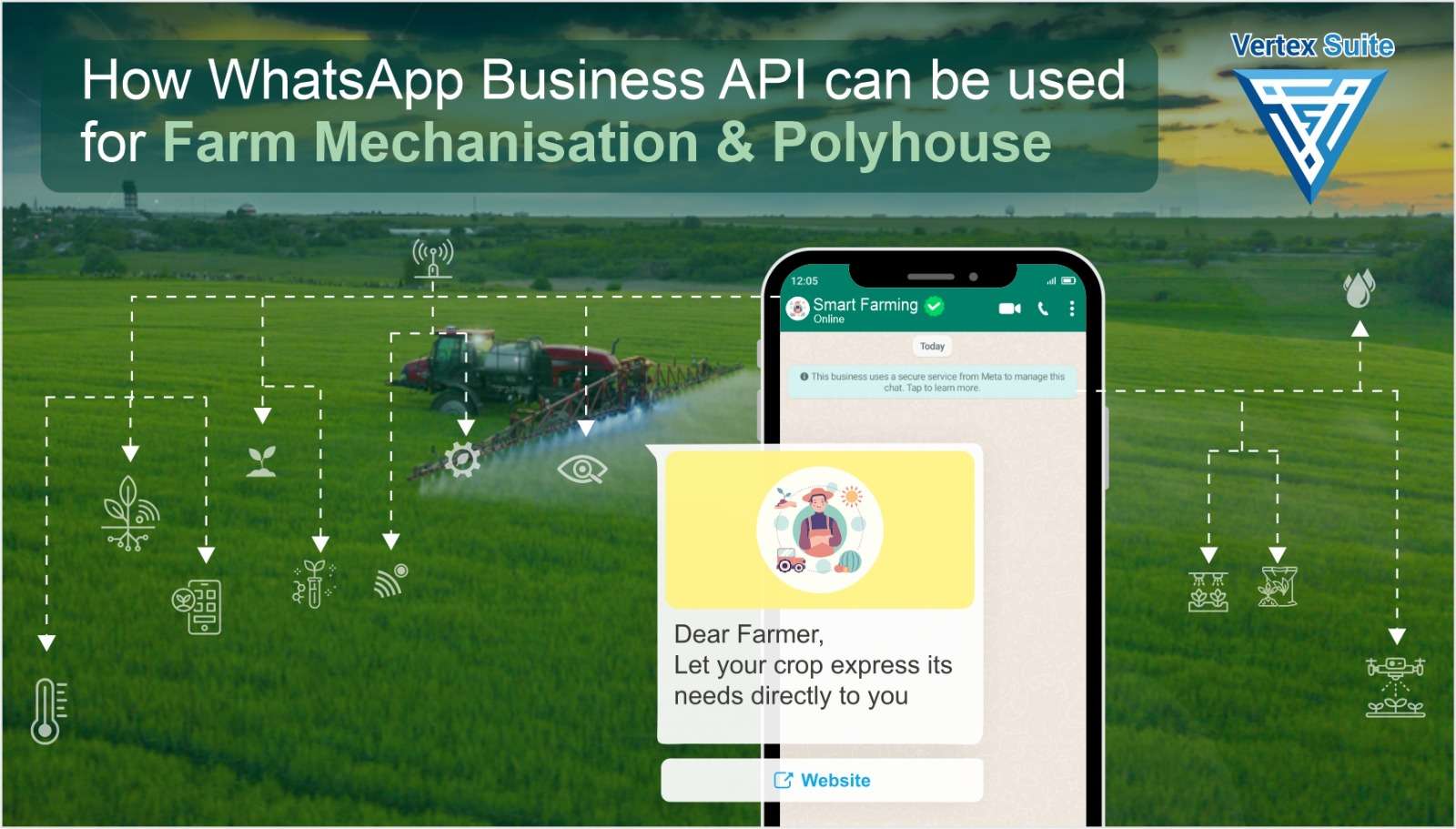Farmers are changing the way they farm by adopting more sustainable practices. They're exploring new methods to enhance crop yield, boost soil fertility, protect crops, and minimize damage to their fields. Smart agriculture is gaining popularity among farmers who manage large areas of land or practice multi-crop irrigation. The integration of WhatsApp Business API and IoT applications into agriculture involves using sensors to assess soil fertility, gather data on environmental conditions, and monitor equipment metrics. This enables farmers to access valuable information and make informed decisions to enhance productivity and improve both farming and livestock practices.
Empowering Agriculture: The Role of WhatsApp Business API and IoT Solutions
The WhatsApp Business API serves as a crucial tool for facilitating real-time communication between users and businesses. In the context of farming, it establishes a direct communication channel connecting farmers with the government and agricultural businesses. Utilizing social media platforms like WhatsApp encourages more active participation from farmers, allowing them to address concerns and engage in discussions and learning. WhatsApp's popularity in rural areas has grown due to its user-friendly interface and low internet connectivity requirements.
In the realm of agriculture, the integration of the Internet of Things (IoT) introduces revolutionary technology for farmers. This technology enables them to access real-time data and insights through sensors and devices. These tools offer a range of facilities to farmers, including communication, instant notifications, updates, and automated processes. Importantly, these features are available in Hindi or local languages, making it accessible to a broader audience. The ability to access these tools remotely also contributes to significant time and manual labor savings for farmers.
Advancing Farming through Sustainable Mechanization
Embracing sustainable agricultural mechanization marks a shift from traditional manual labour-intensive farming to a smarter approach that saves time and enhances the agriculture sector through the use of appropriate tools and machinery.
The concept involves a comprehensive approach to farming, encompassing the selection of the right tools, motors, and equipment used in agricultural lands. These elements play a crucial role in various aspects of farming, including planning seeding, integrating pest and fertilizer management, weed control, monitoring chemical usage on crops, harvesting, storage, weather condition prevention, transportation, and stock supply, among others. The aim is to streamline farming processes, increase efficiency, and promote sustainability in agriculture.
Boosting Productivity through Sustainable Farming Practices
When farmers receive guidance on the right cultivation techniques and implement these methods on their land, they can achieve significantly higher productivity. This not only proves profitable for them but also helps prevent losses. The key lies in utilizing appropriate tools and environmentally friendly machines in farming practices. By doing so, farmers can efficiently produce larger quantities with reduced labor and energy consumption.
These methods prioritize maintaining soil health, minimizing water wastage, preserving the ecosystem balance, and reducing overall energy consumption.
The adoption of these technologies will alleviate the workload of women who are primarily involved in fieldwork. This gradual easing of their burden allows them to focus on other aspects such as dairy farming and livestock management.
Farming Mechanization and Polyhouse Farming in Indian Agriculture
Farm mechanization is a trending concept that involves upgrading conventional farming methods to machinery-based practices. This shift allows agricultural tasks and operations to be performed with less manual labor, as machines and equipment handle most of the work more precisely. The use of machines not only saves time but also reduces the need for a more labours.
Proper training to operate these machines and equipment can significantly improve working conditions in agriculture. Technologies like tractors equipped with GPS, sensors to detect soil quality, automation in drip irrigation systems, drones for large-scale crop monitoring, and the use of plows, harvesters, and seeders make the farming process more efficient and require less labours.
Polyhouse farming:
This is another modern technique gaining popularity among farmers in India. This method aims to increase the cultivation of vegetables, fruits, and flowers, tapping into the vast potential market. Polyhouse farming addresses issues faced by traditional farming methods, such as soil erosion, water scarcity, unpredictable weather conditions, and exposure to unprotected UV rays. It promotes a sustainable approach to farming, offering solutions to challenges while enhancing productivity.
Polyhouse farming, a form of greenhouse cultivation, first practiced in the late 80s, is regaining popularity due to its potential to overcome challenges faced by traditional farming methods. Polyhouses provide a more efficient alternative, widely used in northern regions for cultivating off-season vegetables and spices like capsicum, radish, cauliflower, chili, coriander, onion, spinach, as well as flowers like gerberas, marigolds, and roses. Unlike traditional greenhouses, polyhouses use plastic covers to create a controlled environment for off-season crops on a budget.
The integration of the Internet of Things (IoT) plays a crucial role in polyhouse farming by incorporating smart sensors and automation systems. These sensors monitor environmental conditions such as temperature, humidity, and soil moisture in real-time. Automated systems, controlled through IoT, ensure optimal water usage. This integration not only enhances efficiency but also contributes to sustainable and resource-efficient agriculture. As polyhouse farming continues to advance, it emerges as a smart and viable solution, surpassing traditional agricultural practices.
The impact on the economy is significant, as food becomes more affordable. There is an increased demand for organic farming, leading to healthier agricultural practices, reduced monopoly, and improved financial conditions for farmers. Polyhouse farming stands as a beacon of innovation, transforming the agricultural landscape for a better and more sustainable future.
Revolutionizing Agriculture with IoT and WhatsApp Business API
1. Order Placement and Tracking:
- Farmers easily order machinery, seeds, and supplies through WhatsApp.
- API allows order tracking for monitoring order status and receiving delivery notifications.
2. Real-time Updates:
- Farmers receive instant updates on weather conditions, crop health, and vital agriculture insights via WhatsApp.
- Automated messages send timely alerts on weather changes or disease outbreaks, ensuring crop protection.
3. Technical Support:
- WhatsApp Business API integrates chatbot for technical support.
- Farmers seek guidance on crop management, raise concerns, and troubleshoot equipment, enhancing overall farm efficiency.
4. Appointment Scheduling:
- Farmers schedule appointments for consultations, soil testing, or equipment servicing on WhatsApp.
5. Climate Conditions Monitoring:
- Smart agriculture gadgets update farmers about weather conditions through sensors across fields.
- Data collected from the environment is sent to the cloud for analysis.
6. Greenhouse Automation:
- IoT sensors provide accurate real-time information on greenhouse conditions (lighting, temperature, soil, humidity).
- Automation systems adjust conditions to match parameters, enhancing efficiency.
7. Crop Monitoring:
- Placed in fields, weather stations collect data specific to crop farming.
- Monitors crop growth, detects insects, and prevents diseases harming yield.
8. Agricultural Drones:
- Agricultural drones collect precise agricultural data.
- Better equipped than airplanes and satellites, drones contribute to smart farming advancements.
9. Payment and Invoicing:
- WhatsApp Business API ensures secure payment and invoicing processes.
- Farmers receive invoices, make payments, and track financial transactions transparently and efficiently.
In summary, WhatsApp Business API is revolutionizing agriculture by providing timely updates, efficient order placement, and crucial technical support. This tool contributes to enhanced efficiency, innovation, and collaboration in the agriculture industry, paving the way for a technology-driven future.


